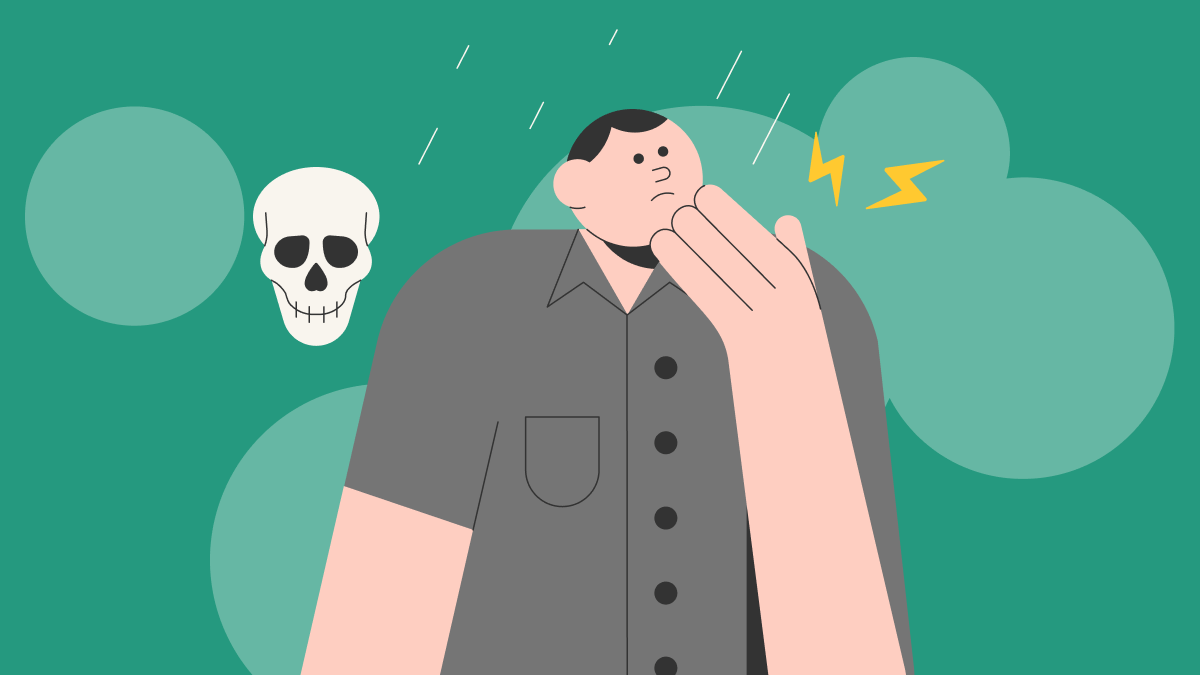Have you ever had an uninvited thought pop into your head suddenly? It could be something that makes you feel mildly uneasy or an extreme thought about putting yourself in danger. These are called intrusive thoughts—unwelcome thoughts that provoke uncomfortable emotions and responses.
Although we call them intrusive thoughts, they aren’t limited to just thoughts. Intrusive thoughts can be both verbal and visual, including mental images and ideas. They are usually caused by stress or anxiety and may persist over long periods. Some individuals may experience intrusive thoughts for a short period following biological or significant life changes, such as the birth of a child.
If what you’ve just read hits close to home, fret not. Studies have shown that over 94% of people experience some form of intrusive thoughts. With that said, not all intrusive thoughts are equally concerning.
Levels of intrusive thoughts
1. Mild
Description: Mildly disturbing thoughts that have little interference with daily life. These may not require professional help.
Examples:
- Picturing yourself slipping and falling while you’re climbing a flight of stairs
- Worrying that a loved one is in danger when you’ve not heard from them in a while

2. Moderate
Description: Disturbing thoughts that cause some interference with daily life. They may also make you feel guilt or shame for having them.
Examples:
- Imagining yourself pushing someone in front of a train while standing on a platform
- Suspecting that your coworkers are colluding against you
3. Severe
Description: Highly disturbing thoughts that cause serious interference with daily life, holding you back from living your life “normally.”
Examples:
- Worrying that you will harm someone if you don’t carry out a certain routine
- Experiencing images of a past experience that cause anxiety, fear, and discomfort
Intrusive thoughts of this severity may be associated with mental health conditions such as Obsessive-Compulsive Disorder (OCD) or Post-Traumatic Stress Disorder (PTSD). In OCD, these intrusive thoughts often trigger compulsions in an attempt to alleviate anxiety and feel safer. For instance, an intrusive thought about contamination may lead to repetitive hand washing, sometimes to the extent that it causes the skin to break or become raw.
How to manage intrusive thoughts
Step 1: Identification
Using the acronym DRAIN, we can identify intrusive thoughts:
| Distressing | Such disturbing or “taboo” content may include violence, harm to self or others, sexual imagery, or actions that are morally wrong. |
| Repetitive and unwanted | These thoughts enter our consciousness despite our efforts to suppress or ignore them. Ironically, trying to fight them often makes them stronger. |
| Awareness of irrationality | We can often recognise that the intrusive thoughts are irrational or out of proportion to the actual risk of harm. Nonetheless, we often still struggle to control or dismiss them. |
| Inconsistency with beliefs and values | These thoughts go against our true beliefs and values and are not behaviours we actually want to engage in. In fact, simply having these intrusive thoughts is enough to evoke feelings of anxiety, fear, guilt, shame, or disgust. These emotional reactions can be intense and may lead to avoidance behaviours or rituals aimed at avoiding the thoughts and reducing distress. |
| Negative self-evaluation | It’s natural to interpret these thoughts as a sign of personal weakness, moral failing, or mental illness. However, it’s important to remember that such negative self-assessment can amplify distress and lead to feelings of guilt and shame. In moments like these, it’s essential to be gentle with yourself. Remind yourself that these emotional reactions are normal responses to unwelcome and uninvited thoughts. You are not to blame for experiencing them. |
Above all, know that having intrusive thoughts doesn’t define who you are or dictate your actions. Your true intentions are separate from these passing thoughts, and they do not determine your worth or character.
Step 2: Interaction
Although our instinct may be to distract ourselves or push away intrusive thoughts, it can actually be beneficial to engage with them. Interacting with a thought doesn’t mean acting on it; instead, it involves acknowledging it as an intrusive thought that doesn’t define you.
One approach to interacting with your thoughts is to repeat the mantra: “My thoughts aren’t facts.” Another method is visualisation. For instance, you could imagine yourself blowing up a balloon. With each intrusive thought, acknowledge and label it, then fill a balloon with it, tie it off, and actively decide to set it aside for the time being. This helps in separating intrusive thoughts from your identity, externalising them to make them seem more manageable, and empowering you to control your response to them.

Step 3: Impartiality
Next, we can take a step back and examine these thoughts impartially.
Essentially, this involves scrutinising the negative beliefs that might be driving your intrusive thoughts and actively challenging and reframing them. Practising impartiality means objectively evaluating the evidence both for and against these negative beliefs.
For instance, if your health anxiety is fueled by the negative belief that “every little ache or pain means I have a serious illness,” you may:
- Acknowledge that common ailments often have benign explanations
- Reflect on past instances where minor symptoms didn’t lead to a serious illness
- Consider alternative explanations for your symptoms such as stress and fatigue
Weigh the evidence to determine if it is a valid or fair belief! If you decide it isn’t, you can replace it with a more realistic compassionate belief instead. This may sound like:
- “My mind is trying to protect me from harm and uncertainty.”
- “It’s okay to experience minor symptoms.”
- “I’ve been through this before and it’s often nothing serious.”
- “I’ll stay attentive to my body while trying to stay calm.”
- “If needed, I can seek guidance from a healthcare professional.”
Therapy for intrusive thoughts
Intrusive thoughts can be incredibly distressing and can leave you feeling overwhelmed and out of control. Even if you perceive your intrusive thoughts to be “mild”, we strongly encourage you to reach out to a mental health professional if you struggle to cope with them independently.
Below are some psychotherapies which counsellors, psychotherapists, and clinical psychologists are qualified to administer.
1. Cognitive Behavioural Therapy (CBT)
What it is:
CBT focuses on identifying and challenging negative thought patterns and replacing them with more realistic and balanced ones. In the context of intrusive thoughts, our CBT-trained psychotherapists can help you recognise their irrationality and develop coping strategies to manage them effectively.
Example:
If you suspect your coworkers are conspiring against you, you may realise that this thought could be influenced by cognitive distortions or past experiences. If paranoia affects your interactions at work, our psychotherapist can also help with social skills training.

2. Exposure and Response Prevention (ERP)
What it is:
Exposure and Response Prevention (ERP), a subtype of CBT, is particularly effective for anxiety disorders marked by intrusive thoughts, like OCD.
ERP entails gradually exposing you to stimuli that provoke intrusive thoughts while refraining from engaging in behaviours that alleviate anxiety related to those thoughts. Over time, this process diminishes the intensity and frequency of intrusive thoughts.
Example:
If you’re grappling with contamination fears, a psychotherapist will guide you to cautiously engage with surfaces you deem unclean and to delay handwashing. As you confront these challenges, they’ll support you in managing the accompanying distressing thoughts and emotions, enhancing your ability to tolerate discomfort through grounding techniques. Gradually, you’ll extend the intervals before you wash your hands. During this journey, you’ll also learn to avoid seeking reassurance or diverting your attention from the discomfort, fostering greater resilience and self-reliance.
3. Acceptance and Commitment Therapy (ACT)
What it is:
ACT is a mindfulness-based therapy that focuses on accepting difficult thoughts and feelings rather than trying to control or eliminate them. It helps you to develop psychological flexibility by clarifying your values and committing to actions that are consistent with those values even when intrusive thoughts are present.
Example:
If you fear losing control and hurting someone, defusion techniques can be beneficial. For instance, you might assign your brain a playful or affectionate name and address it to reduce the seriousness.
For example, you might say, “Thanks for that scary thought, Jackie!” Or if you prefer a more direct approach, “Jackie, I understand you’re concerned for my well-being and trying to protect me from potential harm by highlighting worst-case scenarios.”

Manage intrusive thoughts at Intellect Clinic
Sharing intrusive thoughts with someone else can feel intimidating, and choosing the right confidante is everything. If you’re in Singapore, our team of counsellors, psychotherapists, and clinical psychologists at Intellect Clinic could be that support.
Intellect Clinic offers:
- Affordable rates ($140 for counselling, $220 for clinical sessions)
- Convenient central locations (Tanjong Pagar and Woodleigh)
- Same-week appointments
Learn more about our services here.
This article was reviewed by Linda Rinn, a Clinical Psychologist at Intellect.








